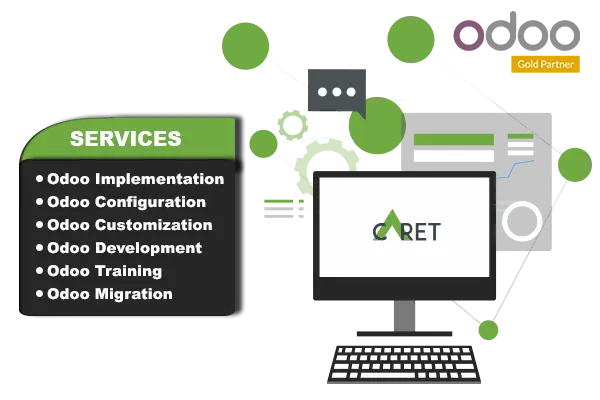Introduction: ERP is Evolving—Is Your Business Ready?
Enterprise Resource Planning (ERP) systems are undergoing a radical transformation. No longer confined to the back office, modern ERP platforms are cloud-based, mobile-friendly, and integrated with AI, IoT, and real-time analytics. At the heart of this digital evolution is Odoo ERP, a flexible and scalable solution that's redefining how businesses manage operations.
In this blog, we’ll explore the latest ERP trends and innovations in Odoo development that are helping businesses streamline processes, increase agility, and stay competitive in a digital-first world. If you’re considering upgrading your systems, this guide will show you how future-ready Odoo ERP solutions can drive real business value.
Why Odoo is Leading ERP Innovation
Odoo has grown rapidly in popularity, particularly among SMEs and mid-sized businesses. Its modular design, open-source flexibility, and lower total cost of ownership make it an ideal choice for companies that want to start small and scale fast.
What makes Odoo a future-proof ERP?
- Cloud and mobile capabilities
- AI and machine learning integration
- Industry-specific customization
- Real-time data and analytics
- Global developer and partner network

Top Trends Shaping the Future of ERP with Odoo
1. AI-Powered Odoo ERP Solutions for Smarter Business Operations
Artificial Intelligence is changing the way companies make decisions. With Odoo integrating AI capabilities, businesses can now automate invoice scanning, detect anomalies in financial records, and even personalize customer communications.
Imagine using AI-powered Odoo ERP solutions for predictive business intelligence—helping you forecast sales, manage inventory, and make smarter purchasing decisions based on real-time data trends.
2. Cloud-Based Odoo ERP Implementation for Global Teams
Today’s workforce is remote and distributed. That's why cloud-based Odoo ERP implementation for global scalability has become essential. Businesses are adopting Odoo.sh and third-party cloud platforms to access their ERP anywhere, anytime.
Cloud deployment reduces infrastructure costs, enhances security, and provides flexibility to grow at scale—especially for organizations expanding across geographies like Canada, Africa, and the Middle East.

3. Odoo Mobility Solutions for Remote Workforce Management
The modern workforce isn’t tied to desks. Field sales agents, delivery staff, and remote managers need access to data on the go. That’s where Odoo mobility solutions for remote workforce management come into play.
These apps empower users with real-time access to CRM, inventory, timesheets, approvals, and expense tracking—all from mobile devices. With improved UX and offline capabilities on the roadmap, the mobile-first ERP trend is only getting stronger.
4. Custom ERP Modules in Odoo for Industry-Specific Workflows
One of Odoo’s biggest strengths lies in its modular architecture. Companies can now use custom ERP modules in Odoo for industry-specific workflows without paying for unnecessary features.
From meat processing and mining to solar energy and e-commerce, Odoo partners are developing tailored apps that match your unique operational needs—speeding up adoption and reducing customization costs.

5. IoT-Enabled Odoo ERP for Smart Factories and Predictive Maintenance
IoT-enabled Odoo ERP is transforming traditional factories into smart production hubs. Using devices like barcode scanners, temperature sensors, and GPS trackers, manufacturers can monitor assets, track real-time performance, and schedule predictive maintenance.
Whether you're managing a warehouse or a shop floor, Odoo’s integration with IoT makes it easier to detect machine issues before they cause downtime—improving productivity and safety.
6. Real-Time Business Analytics with Odoo ERP Dashboards
Odoo’s real-time dashboards give decision-makers instant access to KPIs, trends, and metrics. With the ability to customize reports using Studio or integrate with tools like Power BI, businesses are using Real-time business analytics with Odoo ERP dashboards to guide strategy and execution.
Whether you're a CFO monitoring cash flow or a sales head tracking conversions, Odoo’s visual reports empower you with data-backed decisions.
7. Odoo ERP Integration with Multi-Channel E-commerce and CRM Tools
Today’s customers interact with brands across multiple platforms. That’s why Odoo ERP integration with multi-channel e-commerce and CRM tools is crucial. Odoo connects with platforms like Shopify, Magento, Amazon, and eBay—syncing orders, inventory, and customer data in one place.
For CRM, Odoo’s native apps support WhatsApp messaging, email campaigns, and LinkedIn lead tracking—improving customer service and response times.
8. Automated Workflow Solutions in Odoo ERP for Operational Efficiency
Manual approvals and data entry slow down your business. With automated workflow solutions in Odoo ERP, companies are streamlining HR, accounting, sales, and procurement processes.
You can now define custom triggers, alerts, and conditional logic that saves time, eliminates errors, and boosts efficiency across departments.

Future-Proof Your ERP with Caret IT
Is your current ERP holding you back?
At Caret IT, we help companies implement Odoo ERP solutions tailored to their industry, team size, and business goals. Whether you're in logistics, pharma, real estate, or FMCG, our certified Odoo developers can help you build the right solution.
How Odoo ERP is Evolving Across Industries
Let’s look at how these trends are already shaping real-world business operations:
Logistics & Supply Chain
- GPS-enabled delivery tracking
- Auto-routing and warehouse optimization
- Integrated order-to-delivery visibility
FMCG & Retail
- POS integrated with inventory and loyalty
- Real-time stock updates across outlets
- Predictive restocking based on demand patterns
Manufacturing & Mining
- IoT-based machine monitoring
- Production planning with BOM analytics
- Maintenance automation using sensors
Pharma & Healthcare
- Batch and expiry tracking with barcode
- Regulatory compliance
- Appointment scheduling and patient record management
Energy & Solar
- Project budgeting and timesheet tracking
- Field service mobile access
- Reporting for sustainability and carbon tracking
Common Challenges Solved by Future-Ready Odoo ERP
Challenge | Odoo’s Solution |
Expensive licensing | Open-source, pay-per-module model |
Poor user adoption | Intuitive UI, mobile support, and role-based views |
Difficult integrations | RESTful APIs, connectors for e-commerce, CRM, payment gateways |
Compliance and security risks | 2FA, encrypted backups, audit trails |
Delayed decisions due to scattered data | Unified dashboard and real-time reporting |
Your ERP Strategy Needs a Future-Ready Vision
If you're still using legacy software or fragmented tools, it’s time to upgrade to a future-ready ERP that grows with your business.
With its AI features, mobile-first approach, and custom Odoo ERP solutions for specific industries, Odoo is not just a software—it’s your long-term digital partner.
Adopting these innovations early can improve ROI, reduce operational costs, and give you a competitive edge.
